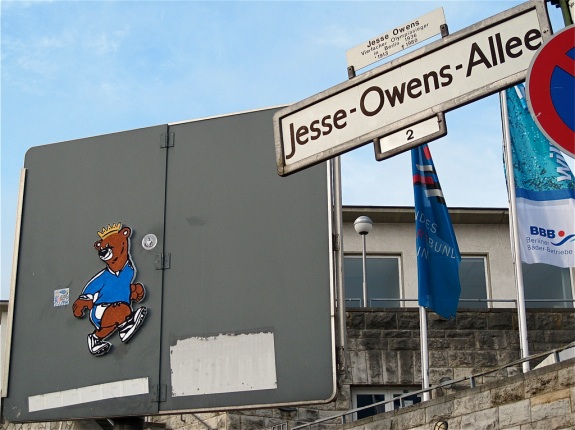76 Years Ago Today, Jesse Owens Proved the Nazis Wrong
In 1936 Jesse Owens won four gold medals at the Berlin Olympics, throwing the idea of Aryan supremacy back into Hitler’s face
/https://tf-cmsv2-smithsonianmag-media.s3.amazonaws.com/filer/20120803061006jesseowens.jpg)
Right now, all eyes are on London. The Olympic games are in full swing, and the whole world is rooting for their respective country. But 76 years ago today, the games were very, very different. They were in Berlin, during Nazi rule. Hitler had hoped to use the games to prove that Aryans were superior to all other races. And, in a lot of events, the Germans took gold. But then came Jesse Owens.
Owens stepped onto the track as one of ten black athletes on the United States track team. And people loved him. Smithsonian writes:
Owens became an instant hero, taking home four gold medals—in the 100 meters, 200 meters, broad jump and 400-meter relay. ”Traveling with the speed of a Mercury incarnate, this most amazing athlete of all time confounded even Hitler, considered no mean achievement in itself,” wrote Drebinger . ”Most every time he stepped on the track he broke a record of some sort and in the end received a record-smashing ovation from a vast gallery that seemed fully cognizant of the fact it was acclaiming a most marvelous athlete.”
Hitler famously refused to congratulate Ownens. He wouldn’t even shake his hand. In fact, our own president didn’t even congratulate him. It wasn’t until 1976 that Gerald Ford gave Owens a Presidential Medal of Freedom. Asked about Hitler’s snub, Owens said this:
“It was all right with me,” he said years later, “I didn’t go to Berlin to shake hands with him, anyway. All I know is that I’m here now, and Hitler isn’t.
“When I came back, after all those stories about Hitler and his snub, I came back to my native country, and I couldn’t ride in the front of the bus. I had to go to the back door. I couldn’t live where I wanted. Now what’s the difference?”
When he got home, there were no big name Nike deals or commercials. Owens got a job as a janitor. He toured with the Harlem Globetrotters, became a disk jockey, and then, eventually, a public speaker. Here, Owens describes what it’s like to get ready for an Olympic race:
“It’s a nervous, a terrible feeling. You feel, as you stand there, as if your legs can’t carry the weight of your body. Your stomach isn’t there, and your mouth is dry, and your hands are wet with perspiration. And you begin to think in terms of all those years that you have worked. In my particular case, the 100 meters, as you look down the field 109 yards 2 feet away, and recognizing that after eight years of hard work that this is the point that I had reached and that all was going to be over in 10 seconds,” said Owens. “Those are great moments in the lives of individuals.”
Owens also inspired an unlikely hero in the 1948 Olympics, the last time the games were in London. Fanny Blankers-Koen, a 6-foot tall mother from Holland won four gold medals while pregnant with a third child. In 1936, the year Owens won his golds, Fanny met him:
She attended the Games, and although she did not medal in her events, she did manage to meet and get an autograph from her hero, the African-American track star Jesse Owens, whose record four gold medals she would later match in London. The meeting was, she would later say, her most treasured Olympic memory.
Today, 76 years after he won gold, the memory of his feats is so powerful that in Berlin, a city once ruled by a mad dictator who refused to shake Owens’ hand, there’s a street named in his honor.
More from Smithsonian.com:
/https://tf-cmsv2-smithsonianmag-media.s3.amazonaws.com/accounts/headshot/Rose-Eveleth-240.jpg)

/https://tf-cmsv2-smithsonianmag-media.s3.amazonaws.com/accounts/headshot/Rose-Eveleth-240.jpg)